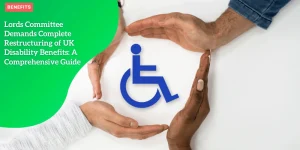DWP PIP Changes Explained: Everything You Need to Know About New Payment Systems and Eligibility
Anúncios
Overview of DWP’s PIP Transformation
The Department for Work and Pensions (DWP) is initiating a significant overhaul of the Personal Independence Payment (PIP) system, aiming to transform the entire service.
This major revision addresses the needs of over three million disability benefit claimants in the UK.
Anúncios
The goal is to enhance the application process, eligibility criteria, decision-making, and payment structures.
These changes are part of the Health Transformation Programme, an initiative launched by the previous Conservative administration.
Anúncios
Scope and Objectives of the Health Transformation Programme
The Health Transformation Programme intends to modernize and simplify health and disability benefit services.
The overarching objective is to improve the user experience for individuals applying for PIP.
To achieve this, the programme will introduce a new single health assessment service that applies to all benefits requiring a functional health assessment.
This unified procedure aims to streamline the evaluation process, ensuring consistency and fairness in benefit delivery.
National Rollout Timeline
A phased approach will guide the national rollout of these transformations, with full implementation planned by 2029.
This extended timeline allows for the detailed testing and refinement of new processes and systems.
According to Social Security Minister Sir Stephen Timms, the shift promises to be extensive, covering the entire PIP service spectrum, from the initial discovery of benefits to final decisions on eligibility and payments.
The upcoming chapter will delve into the specific changes to the PIP system, including the introduction of the new single health assessment service and alterations to the eligibility criteria and decision-making processes.
Key Changes to PIP System
Introduction of New Single Health Assessment Service
The Department for Work and Pensions (DWP) is set to introduce a streamlined single health assessment service for all benefits requiring a functional health assessment.
This change is part of the broader Health Transformation Programme aimed at simplifying the process for claimants.
The single assessment service intends to reduce redundancy and make the experience more straightforward for applicants seeking multiple benefits.

Changes Affecting Eligibility Criteria and Decision-making Process
Another significant area of reform involves adjustments to the eligibility criteria and the decision-making process.
The goal is to make these systems more transparent and efficient, but claimants may need to understand how these changes affect their specific situations.
With revised guidelines, the criteria for qualification could become more stringent, potentially impacting individuals with fluctuating health conditions or less visible impairments.
Transformation of Payment Structures and Benefit Delivery
Notably, there will also be a transformation in how payments are structured and delivered.
The DWP aims to ensure timely and accurate payments while simplifying administrative burdens.
This overhaul could mean new payment schedules and methods, ensuring claimants get their benefits more efficiently and securely.
It’s an effort to modernize the system and address issues related to delayed payments and errors.
These changes signify the DWP’s commitment to modernizing and simplifying the PIP system while ensuring it remains fair and effective.
Transition to Upcoming Policy Developments
As the program advances, further policy updates and initiatives will continue to shape its implementation, providing essential context and guidance for stakeholders and claimants alike.
Upcoming Policy Developments
Details About the Forthcoming Health and Disability Green Paper
The Department for Work and Pensions (DWP) is gearing up to release the Health and Disability green paper in Spring.
This document will play a crucial role in outlining further reforms to the UK’s disability benefit system.
The green paper aims to deepen the consultations with disabled people and relevant organizations to align any proposed changes with the real needs of the beneficiaries.
By engaging stakeholders, the DWP hopes to better tailor the welfare system, enhancing its efficiency and effectiveness.
Proposed Welfare Savings of £3 Billion
A significant aspect of the upcoming policy developments is the target of achieving £3 billion in welfare savings.
This objective matches the financial goals set by the previous Conservative administration.
However, the government faces the challenge of balancing these savings with the need to maintain appropriate support for those who depend on these benefits.
As the DWP moves forward, the careful management of resources will be pivotal to ensuring that the welfare system remains both sustainable and fair.
Planned Reforms to Work Capability Assessment
Central to the transformation agenda are the planned reforms to the work capability assessment.
These reforms are part of a broader initiative designed to better align the assessment process with the current needs of claimants.
However, this shift has sparked concerns, especially regarding the impact it may have on individuals with mental health issues.
As the new system takes shape, it’s likely that the qualification criteria for disability benefits will become more stringent, potentially making it harder for some individuals to qualify for support.
Social Security Minister Sir Stephen Timms emphasized the importance of adapting the system to accommodate the complex and fluctuating nature of many health conditions that people experience today.
As the DWP continues its efforts to modernize the PIP system, the next steps will involve aligning these proposed changes with the needs of the most vulnerable citizens.
The success of these reforms will depend on the government’s ability to genuinely incorporate feedback from disabled individuals and their advocates.
This engagement will be critical in ensuring that the new policies not only achieve the intended welfare savings but also uphold the rights and dignity of those in need.
Impact on Mental Health Claimants
Potential Challenges for Mental Health-Related Benefit Claims
The upcoming PIP transformation under the Health Transformation Programme will undoubtedly present notable challenges for claimants with mental health conditions.
The proposed changes focus heavily on restructuring the eligibility criteria and decision-making processes, which many fear will make it more difficult for individuals with mental health issues to qualify for disability benefits.
Changes to Qualification Criteria for Disability Benefits
One of the most significant changes is the introduction of the new single health assessment service.
This service will evaluate eligibility for all benefits requiring a functional health assessment, including PIP.
The reformed criteria are expected to place a stronger emphasis on the capacity to work, even if it overlooks the complex and fluctuating nature of mental health conditions.
Thus, claimants may face more stringent evaluations and find it harder to demonstrate the extent and impact of their mental health issues during assessments.
Concerns Regarding Access to Support for Mental Health Conditions
Another major concern is the potential reduction in access to necessary support services for those with mental health conditions.
With the government aiming for £3 billion in welfare savings, there is anxiety that cost-cutting measures may indirectly limit access to critical resources and support systems.
Mental health advocates emphasize the importance of personalized assessments that consider the unique challenges faced by individuals with mental health conditions, rather than applying a one-size-fits-all approach.
As these changes unfold, providing targeted resources and ensuring a robust support network will be crucial in maintaining fair and equitable access to benefits for mental health claimants.
Detection and incorporation of claimant feedback during consultations are essential steps to mitigate potential negative impacts and uphold the dignity of those affected.
Stakeholder Responses and Concerns
Feedback from Disability Rights Organizations and Charities
The upcoming changes to the Personal Independence Payment (PIP) system have garnered a range of reactions from stakeholders, particularly disability rights organizations and charities.
Many organizations have expressed apprehension about how these reforms might impact the very individuals they seek to protect.
Charities such as Disability Rights UK and other prominent groups have been vocal about their concerns.
They have emphasized that any new consultation processes need to be genuine and inclusive.
They fear that sweeping changes might inadvertently exclude or disadvantage those who rely heavily on these benefits for their daily living, particularly those with fluctuating health conditions such as mental health issues.
Anela Anwar, the CEO of anti-poverty charity Z2K, stressed the importance of a genuine consultation process.
In a statement, she noted, “The government should abandon these cruel and poorly thought-out plans.
And when it comes to consulting on hugely important changes to the benefits system, this government must not repeat the mistakes of the previous one.”
Calls for Genuine Consultation Process
A recurring theme among stakeholders is the urge for the government to engage in an honest and transparent consultation process.
Many are wary of a repeat scenario where consultations are merely a formality, without substantial input from the very people affected by the changes.
Disability rights advocates argue that any modifications to the PIP system should be informed by the lived experiences and needs of disabled individuals.
There is also a pressing need to clarify how the planned welfare savings of £3 billion will be achieved without negatively impacting those who already face significant barriers in society.
Concerns About Impact on Vulnerable Beneficiaries
Finally, there are deep concerns about how the proposed changes will impact vulnerable beneficiaries.
Critics argue that the new eligibility criteria and single health assessment service could make it more difficult for individuals, especially those with mental health conditions, to qualify for PIP.
There are fears that these reforms may lead to a cutback in support services, leaving many without the necessary financial aid to live independently.
Stakeholders continue to call for a robust support network and personalized assessment processes that appreciate the complex and varying needs of disabled individuals.
Addressing these concerns head-on will be critical to the success and fairness of the PIP transformation.
It is crucial for claimants to stay informed about these developments and their potential implications.
What Claimants Need to Know
Guidance for Current PIP Recipients About Upcoming Changes
Current Personal Independence Payment (PIP) recipients need to be aware that significant changes are on the horizon as part of the Health Transformation Programme.
These reforms are designed to streamline the application process and ensure fairness and efficiency across the system.
Being informed about these changes will help you manage the transition and maintain your benefits.
Steps to Prepare for New Assessment Processes
Preparing for the new assessment processes is crucial.
Here are some steps to help you navigate these changes:
- Stay Informed: Keep up to date with announcements from the Department for Work and Pensions (DWP) about the upcoming changes to PIP. Regularly check the DWP website and other reputable sources.
- Gather Documentation: Ensure all medical and supporting documentation is up to date. This includes letters from healthcare providers, medical records, and any other relevant documents that demonstrate your eligibility.
- Understand the Criteria: Familiarize yourself with the new eligibility criteria and assessment processes. Knowing what to expect can help you prepare more effectively.
- Seek Advice: If you’re unsure about any aspect of the changes, seek advice from a benefits advisor or a charity specializing in disability rights such as Disability Rights UK.
Resources and Support Available During Transition Period
During the transition period, several resources and support options are available to help you:
- DWP Information Sessions: The DWP will be holding information sessions to explain the new processes and answer any questions you may have.
- Advisory Services: Various organizations, including Citizens Advice and local disability support groups, can provide guidance on navigating the new PIP system.
- Online Tools and Resources: Utilize online resources and tools provided by disability rights organizations to understand your rights and what you need to do to prepare.
- Helplines and Support Networks: Contact helplines for personalized support and advice regarding your PIP claims and the new assessment processes.
Staying informed and proactive will be key to managing this transition smoothly.
Engage with available resources and support networks to ensure you are well-prepared for the upcoming changes.






